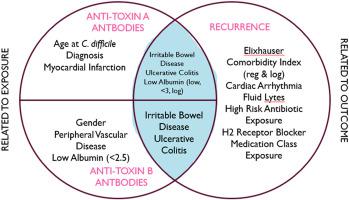Anaerobe ( IF 2.3 ) Pub Date : 2020-11-21 , DOI: 10.1016/j.anaerobe.2020.102299 Julie Gilbert 1 , Jhansi Leslie 2 , Rose Putler 2 , Shayna Weiner 3 , Alexandra Standke 3 , Aline Penkevich 3 , Micah Keidan 3 , Vincent B Young 4 , Krishna Rao 3

|
Clostridium difficile infection (CDI) recurs in ∼20% of patients. Prior studies indicated that antibody responses directed against the C. difficile toxins A and B were potentially associated with lower risk of recurrent CDI. Here we tested the hypothesis that circulating anti-toxin IgG antibody levels associate with reduced risk of recurrent CDI. A cohort study with prospective enrollment and retrospective data abstraction examined antibody levels in 275 adult patients at the University of Michigan with CDI. We developed an enzyme linked immunosorbent assay to detect IgG antibodies against toxin A and toxin B in sera obtained at the time of diagnosis. Logistic regression examined the relationship between antibody levels and recurrence, and sensitivity tests evaluated for follow-up and survivor biases, history of CDI, and PCR ribotype. Follow-up data were available for 174 subjects, of whom 36 (20.7%) had recurrence. Comparing antibody levels vs. recurrence and CDI history, anti-toxin A levels were similar, while anti-toxin B levels had a greater range of values. In unadjusted analysis, detection of anti-toxin A antibodies, but not anti-toxin B antibodies, associated with an increased risk of recurrence (OR 2.71 [1.06, 8.37], P = .053). Adjusting for confounders weakened this association. The results were the same in sensitivity analyses. We observed a borderline increased risk of recurrence in patients positive for anti-toxin A antibodies, and sensitivity analyses showed this was not simply a reflection of prior exposure status. Future studies are needed to assess how neutralizing antibody or levels after treatment associate with recurrence.
中文翻译:

抗毒素抗体与复发性艰难梭菌感染无关
大约 20% 的患者会复发艰难梭菌感染 (CDI)。先前的研究表明,针对艰难梭菌的抗体反应毒素 A 和 B 可能与较低的 CDI 复发风险相关。在这里,我们检验了循环抗毒素 IgG 抗体水平与 CDI 复发风险降低相关的假设。一项前瞻性登记和回顾性数据提取的队列研究检查了密歇根大学 275 名 CDI 成年患者的抗体水平。我们开发了一种酶联免疫吸附试验来检测诊断时获得的血清中针对毒素 A 和毒素 B 的 IgG 抗体。逻辑回归检查了抗体水平与复发之间的关系,并评估了随访和幸存者偏差、CDI 病史和 PCR 核糖型的敏感性测试。174 名受试者有随访数据,其中 36 名(20.7%)复发。比较抗体水平与复发和 CDI 历史,抗毒素 A 水平相似,而抗毒素 B 水平具有更大范围的值。在未经调整的分析中,检测到抗毒素 A 抗体而非抗毒素 B 抗体与复发风险增加相关(OR 2.71 [1.06, 8.37],P = .053)。调整混杂因素削弱了这种关联。敏感性分析的结果相同。我们观察到抗毒素 A 抗体阳性患者的复发风险临界增加,敏感性分析表明这不仅仅是先前暴露状态的反映。未来的研究需要评估治疗后中和抗体或水平与复发的关系。


























 京公网安备 11010802027423号
京公网安备 11010802027423号